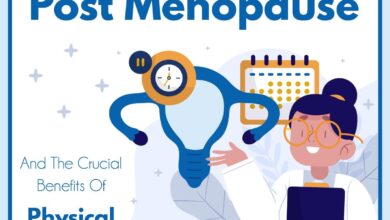
When to See a Doctor for Heavy Periods
When to see doctor for heavy periods – When to see a doctor for heavy periods? It’s a question many women grapple with, unsure when a heavy flow crosses the line from normal to needing medical attention. We’re all different, and what constitutes “heavy” can vary wildly. This post aims to clarify the signs and symptoms that warrant a doctor’s visit, helping you navigate this often-uncomfortable topic with confidence and knowledge.
From understanding the medical definition of menorrhagia (the clinical term for abnormally heavy menstrual bleeding) to exploring potential causes like hormonal imbalances or uterine fibroids, we’ll cover the essential information you need to make informed decisions about your health. We’ll also discuss home management strategies, diagnostic tests, and treatment options, empowering you to take control of your menstrual health.
Defining “Heavy Periods”

Source: co.uk
Understanding what constitutes a “heavy period” is crucial for seeking appropriate medical attention. Many women experience variations in their menstrual cycle, but knowing when that variation crosses the line into a potential health concern is key. This involves understanding both the volume of blood loss and the associated symptoms.Menorrhagia, the medical term for heavy menstrual bleeding, is defined by both the amount of blood lost and the duration of bleeding.
Generally, menorrhagia is diagnosed when a woman loses more than 80ml of blood during her menstrual period, lasting longer than 7 days. However, this measurement isn’t always easily obtained, and the diagnosis often relies on a combination of factors including the woman’s own perception and assessment of her bleeding.
Symptoms Associated with Heavy Menstrual Bleeding
Excessive blood loss is the primary symptom, but heavy periods often come with other uncomfortable and sometimes debilitating symptoms. These can include prolonged bleeding (beyond seven days), passing large clots (larger than a quarter), needing to change sanitary products every hour or less, experiencing anemia (due to iron deficiency from blood loss), feeling faint or dizzy, and experiencing significant fatigue or weakness.
These additional symptoms can significantly impact a woman’s daily life, affecting work, social activities, and overall well-being.
Underestimation and Overestimation of Blood Loss
Women often struggle to accurately assess their blood loss. Underestimation might occur if a woman uses lighter sanitary products that don’t readily show the amount of blood lost, or if she’s accustomed to heavier periods and doesn’t perceive the volume as excessive. Overestimation might happen if a woman experiences a particularly heavy day or two, leading her to believe her overall blood loss is far greater than it actually is.
For example, a woman who experiences a very heavy day, requiring frequent changes, might overestimate her total blood loss for the entire cycle, while someone who uses tampons and only experiences a slight increase in the number used may underestimate the true amount.
Methods for Measuring Menstrual Blood Loss
Accurately measuring menstrual blood loss can be challenging at home, but several methods offer varying degrees of accuracy.
| Method | Description | Accuracy | Advantages |
|---|---|---|---|
| Sanitary Product Weighting | Weighing used sanitary products before and after use, calculating the difference, and converting to milliliters. | Moderate | Relatively simple and readily available materials. |
| Visual Estimation | Subjectively assessing blood loss based on the saturation of sanitary products. | Low | Easy and requires no special tools. |
| Menstrual Diary | Tracking the frequency of sanitary product changes and the level of saturation. | Low to Moderate | Helps track patterns over time. |
| Picture Chart Comparison | Comparing the amount of blood on a sanitary product to images depicting different blood loss volumes. | Moderate | Provides a visual aid for comparison. |
Causes of Heavy Periods: When To See Doctor For Heavy Periods
Heavy menstrual bleeding, or menorrhagia, can stem from a variety of factors, ranging from simple hormonal fluctuations to more complex underlying medical conditions. Understanding these causes is crucial for effective diagnosis and treatment. This section explores the common and less common causes, highlighting the symptoms associated with each.
Hormonal Imbalances
Hormonal imbalances are a frequent culprit behind heavy periods. Fluctuations in estrogen and progesterone, the hormones primarily responsible for regulating the menstrual cycle, can lead to an overgrowth of the uterine lining, resulting in heavier bleeding. This imbalance can occur due to various reasons, including polycystic ovary syndrome (PCOS), thyroid problems, and perimenopause (the transition to menopause). Symptoms can vary, but often include irregular cycles, heavier than usual bleeding, and potentially acne or weight changes associated with the underlying hormonal condition.
For example, a woman with PCOS might experience prolonged, heavier periods alongside irregular cycles and difficulty conceiving.
Uterine Fibroids and Polyps, When to see doctor for heavy periods
Benign growths in the uterus, such as fibroids and polyps, are also common causes of heavy menstrual bleeding. Fibroids are muscular tumors that develop within the uterine wall, while polyps are small growths that protrude from the uterine lining. Both can increase the surface area of the uterine lining, leading to heavier blood flow. Symptoms can include prolonged bleeding, heavy clots, pelvic pain, and pressure.
A woman with uterine fibroids might experience prolonged, heavy bleeding accompanied by persistent pelvic pain and pressure. The size and location of these growths influence the severity of symptoms.
Blood Clotting Disorders
Less frequently, heavy menstrual bleeding can be a symptom of a blood clotting disorder. These disorders interfere with the body’s ability to form blood clots, potentially leading to prolonged and heavier bleeding. Von Willebrand disease is a common example. Symptoms in this case might include unusually heavy bleeding during menstruation, but also prolonged bleeding from minor cuts or bruises.
It’s crucial to note that such disorders often present with additional symptoms beyond heavy periods.
Medications
Certain medications can also contribute to heavier periods. Some medications, including certain anticoagulants (blood thinners) and intrauterine devices (IUDs), may increase the risk of heavier bleeding as a side effect. It’s vital to discuss any medication you’re taking with your doctor if you’re experiencing unusually heavy bleeding, as they can help determine if your medication is a contributing factor.
For example, a patient on a new anticoagulant medication might experience heavier periods as a side effect, requiring a discussion with their physician about potential adjustments.
So, when should you see a doctor about heavy periods? If you’re soaking through pads or tampons every hour, or experiencing symptoms like severe pain or fatigue, it’s definitely time to get checked out. It’s a reminder that looking after your overall health is crucial; just like how Monali Thakur’s hospitalization highlights the importance of preventing respiratory diseases , paying attention to your menstrual health is equally vital.
Ignoring heavy periods can lead to complications down the line, so don’t hesitate to seek medical advice.
Lifestyle Factors Influencing Menstrual Bleeding
Several lifestyle factors can influence the heaviness of menstrual bleeding. It’s important to note that while these factors might not directly
cause* heavy periods, they can exacerbate existing issues or contribute to irregularities.
- Stress: Chronic stress can disrupt hormonal balance, potentially leading to heavier periods.
- Diet: A diet lacking in essential nutrients can affect hormonal balance and overall health, potentially impacting menstrual regularity and flow.
- Weight: Both being significantly underweight and overweight can disrupt hormonal balance and menstrual cycles.
- Exercise: While regular exercise is generally beneficial, excessive or intense exercise can disrupt hormonal balance and lead to irregular or lighter periods, but in some cases, may contribute to heavier periods if it is intense and coupled with other factors.
When to Seek Medical Attention
Dealing with heavy periods can be incredibly disruptive to your life, but knowing when to seek medical attention is crucial for your health and well-being. While some menstrual irregularities are manageable at home, certain symptoms warrant immediate medical evaluation, while others require a doctor’s visit within a reasonable timeframe. Understanding the difference can help you make informed decisions about your care.
Situations Requiring Immediate Medical Attention
Heavy bleeding accompanied by other serious symptoms demands immediate medical attention. Delaying treatment in these cases can lead to dangerous complications. These symptoms can indicate a more serious underlying condition that needs prompt diagnosis and treatment.
- Severe Anemia Symptoms: Feelings of extreme fatigue, dizziness, shortness of breath, or a rapid heartbeat, especially combined with heavy bleeding, could signify severe anemia (low iron levels) requiring immediate medical intervention, potentially including blood transfusions.
- Heavy Bleeding with Severe Pain: Intense abdominal pain, cramping, or pain that doesn’t respond to over-the-counter pain relievers warrants an immediate visit to the doctor or emergency room. This could indicate complications like ectopic pregnancy (pregnancy outside the uterus), or other serious conditions.
- Signs of Infection: Fever, chills, foul-smelling vaginal discharge, or severe pelvic pain alongside heavy bleeding could indicate an infection, requiring immediate antibiotic treatment.
- Sudden, Unexpected Heavy Bleeding: A sudden onset of unusually heavy bleeding, especially after a period of normal menstruation, requires prompt medical attention to rule out serious causes like uterine fibroids or polyps.
Situations Requiring Medical Advice Within a Few Days or Weeks
While not immediately life-threatening, persistent heavy bleeding or related symptoms necessitate a doctor’s visit within a short time frame. Early intervention can often prevent complications and lead to more effective treatment.
- Prolonged Heavy Bleeding: Periods lasting longer than seven days, even without other significant symptoms, should be discussed with your doctor. This could indicate an underlying hormonal imbalance or other treatable condition.
- Soaking Through More Than One Pad or Tampon Per Hour: Consistent heavy bleeding requiring frequent changes of sanitary products, even without other symptoms, warrants a medical evaluation to rule out any underlying causes.
- Passing Large Blood Clots: The regular passage of large blood clots, larger than a quarter, can indicate a problem that requires medical attention.
- Persistent Heavy Bleeding Affecting Daily Life: If heavy periods significantly interfere with your daily activities, such as work, school, or social life, seeking medical advice is recommended to explore treatment options.
Decision Flowchart for Scheduling a Doctor’s Appointment
The following flowchart helps determine when to schedule an appointment based on the severity and duration of your symptoms.
| Symptom Severity | Symptom Duration | Action |
|---|---|---|
| Severe anemia symptoms, intense pain, infection signs, sudden heavy bleeding | Any duration | Seek immediate medical attention (emergency room or urgent care) |
| Prolonged heavy bleeding (more than 7 days), soaking through more than one pad/tampon per hour, passing large clots, significant impact on daily life | More than a few days | Schedule a doctor’s appointment within a few days or weeks |
| Mild to moderate heavy bleeding, manageable with over-the-counter pain relievers | Less than a week | Monitor symptoms; consult doctor if symptoms worsen or persist |
Warning Signs Requiring Immediate Medical Evaluation
Several warning signs indicate a need for immediate medical attention, even without heavy bleeding. These symptoms should not be ignored.
- Severe abdominal pain: Intense pain that is sudden and debilitating.
- Vaginal bleeding after menopause: Any bleeding after menopause requires immediate investigation.
- Fainting or lightheadedness: These can be signs of significant blood loss.
- Fever and chills: Suggestive of an infection.
Diagnostic Procedures
Figuring out the cause of heavy menstrual bleeding requires a careful evaluation by your doctor. Several diagnostic procedures are commonly used to get a complete picture and guide treatment. These tests help pinpoint the underlying issue, whether it’s hormonal imbalances, uterine fibroids, or other potential causes.
Pelvic Examination
A pelvic exam is a standard part of the initial assessment. The doctor will visually inspect the external genitalia and then, using gloved fingers, examine the internal organs including the cervix, uterus, and ovaries. This allows them to check for any abnormalities like masses, growths, or infections that might be contributing to the heavy bleeding. The information gathered during the pelvic exam provides a crucial initial assessment before other tests are ordered.
For instance, a noticeably enlarged uterus might suggest the presence of fibroids.
Blood Tests
Several blood tests can help assess various factors related to heavy menstrual bleeding. A complete blood count (CBC) checks for anemia, a common complication of heavy periods, by measuring hemoglobin and hematocrit levels. Low levels indicate blood loss. Hormone level tests, such as those measuring follicle-stimulating hormone (FSH), luteinizing hormone (LH), thyroid-stimulating hormone (TSH), and prolactin, help assess the function of the endocrine system and rule out hormonal imbalances as the cause.
These hormone levels fluctuate throughout the menstrual cycle, and abnormal patterns can point to underlying problems affecting the regularity and heaviness of bleeding.
Ultrasound
Ultrasound uses high-frequency sound waves to create images of the pelvic organs. A transabdominal ultrasound (probe placed on the abdomen) or a transvaginal ultrasound (probe inserted into the vagina) can visualize the uterus and ovaries. This allows the doctor to identify uterine fibroids, polyps, or other structural abnormalities within the uterus. The size, location, and number of fibroids can be determined, offering valuable information about the severity of the condition and the potential impact on bleeding.
Ultrasound can also detect endometrial thickening, which can be a sign of various conditions, including endometrial hyperplasia or cancer.
Other Diagnostic Procedures
In some cases, additional tests may be necessary to reach a definitive diagnosis. These could include:
- Hysteroscopy: A thin, lighted tube is inserted into the uterus to visualize the uterine lining and allow for the removal of polyps or other tissue samples for biopsy.
- Sonohysterography (SHG): Saline solution is injected into the uterus during an ultrasound, improving visualization of the uterine cavity and identifying abnormalities.
- Endometrial Biopsy: A small sample of the uterine lining is removed and examined under a microscope to detect abnormalities like hyperplasia or cancer.
These procedures provide more detailed information about the uterine lining and can help diagnose conditions not readily visible through other imaging techniques.
| Diagnostic Procedure | Advantages | Disadvantages |
|---|---|---|
| Pelvic Examination | Quick, inexpensive, provides initial assessment | Limited in detecting internal abnormalities |
| Blood Tests | Assess hormonal imbalances, detect anemia | Cannot directly visualize uterine abnormalities |
| Ultrasound | Non-invasive, visualizes uterine structures, detects fibroids, polyps | Image quality can be affected by factors like obesity |
| Hysteroscopy | Direct visualization of uterine cavity, allows for tissue removal | Invasive procedure, requires anesthesia |
| Sonohysterography | Improved visualization compared to standard ultrasound | Slightly invasive, may cause discomfort |
| Endometrial Biopsy | Direct tissue examination, definitive diagnosis of some conditions | Invasive procedure, potential for bleeding and cramping |
Treatment Options

Source: patientpop.com
Dealing with heavy menstrual bleeding can be challenging, but thankfully, several effective treatment options are available. The best approach depends on the underlying cause, your overall health, and your personal preferences. It’s crucial to discuss these options thoroughly with your doctor to determine the most suitable course of action for you.
So, when should you see a doctor about heavy periods? If you’re soaking through pads or tampons hourly, or experiencing other concerning symptoms, it’s definitely time to schedule an appointment. Understanding your body is key, and sometimes heavy bleeding can be linked to other health issues, like high blood pressure, which is one of the risk factors that make stroke more dangerous.
Paying attention to your cycle is important for overall health; don’t hesitate to seek medical advice if you’re worried.
Treatment for heavy periods can range from simple lifestyle changes to more involved medical interventions. The goal is to reduce blood loss, alleviate symptoms, and address any underlying medical conditions contributing to the problem. Often, a combination of approaches proves most effective.
Medications
Medications play a significant role in managing heavy menstrual bleeding. Several types of drugs can effectively reduce blood flow and alleviate associated symptoms.
Hormonal therapies are frequently used. These medications work by altering the hormonal balance in the body, thus reducing the thickness of the uterine lining and subsequently the amount of menstrual bleeding. Examples include birth control pills (containing estrogen and progestin), progestin-only pills, and intrauterine devices (IUDs) that release hormones (like Mirena or Kyleena). These options are often effective, but side effects such as weight gain, mood changes, or breast tenderness can occur.
Non-hormonal medications, such as tranexamic acid, are also available. Tranexamic acid works by reducing the breakdown of blood clots, thereby lessening menstrual bleeding. It’s typically taken during the menstrual period and generally well-tolerated, although side effects like nausea or diarrhea are possible.
Surgical Interventions
In some cases, surgical interventions may be necessary to manage persistent heavy bleeding that doesn’t respond to other treatments.
These procedures aim to either reduce the amount of uterine lining or completely remove the uterus. One common procedure is endometrial ablation, which uses heat, cold, or other energy sources to destroy the uterine lining. This is a minimally invasive procedure that can significantly reduce bleeding. However, it’s not suitable for all women, particularly those who wish to have children in the future.
So, you’re wondering when to see a doctor about heavy periods? It’s crucial to address excessive bleeding, but it got me thinking about other health markers. I recently read an interesting article about how an eye test might detect dementia risk in older adults, can eye test detect dementia risk in older adults , which highlights how seemingly unrelated tests can reveal important health information.
Getting regular checkups, whether for heavy periods or other concerns, is key to maintaining your overall well-being.
Hysterectomy, the surgical removal of the uterus, is a more drastic option, but it effectively stops menstrual bleeding permanently. It’s generally considered only after other treatments have failed and when the benefits outweigh the risks of major surgery.
Lifestyle Changes
Lifestyle modifications can sometimes help manage heavy periods, particularly when combined with other treatments.
Maintaining a healthy weight, regular exercise, and a balanced diet can contribute to overall hormonal balance and potentially reduce menstrual flow. Stress reduction techniques, such as yoga or meditation, can also play a beneficial role, as stress can exacerbate certain hormonal imbalances. However, it’s important to remember that lifestyle changes alone are unlikely to resolve significantly heavy periods if an underlying medical condition is the cause.
Comparison of Treatment Options
| Treatment Option | Mechanism of Action | Potential Side Effects |
|---|---|---|
| Hormonal Therapies (Birth control pills, IUDs) | Alters hormonal balance, reducing uterine lining thickness | Weight gain, mood changes, breast tenderness, nausea |
| Tranexamic Acid | Reduces blood clot breakdown | Nausea, diarrhea |
| Endometrial Ablation | Destroys the uterine lining | Scarring, infection, potential need for further procedures |
| Hysterectomy | Surgical removal of the uterus | Surgical risks (infection, bleeding), menopause |
| Lifestyle Changes (Weight management, stress reduction) | Improves overall hormonal balance | Requires commitment and may not be sufficient for severe cases |
Managing Heavy Periods at Home
Dealing with heavy periods can be challenging, but several home management strategies can help alleviate discomfort and improve your overall well-being. These strategies focus on pain relief, hygiene, and tracking your cycle to better understand your body and potentially identify underlying issues. Remember, while these methods can offer significant relief, they are not a replacement for professional medical advice if your heavy bleeding is persistent or concerning.
Over-the-Counter Pain Relief and Hygiene Practices
Managing the pain and discomfort associated with heavy periods often involves over-the-counter medications. Nonsteroidal anti-inflammatory drugs (NSAIDs), such as ibuprofen or naproxen, can effectively reduce pain and inflammation. Remember to follow the dosage instructions carefully. Maintaining good hygiene is crucial during heavy periods. Frequent changes of sanitary products are essential to prevent infections and odor.
A warm bath or shower can also provide comfort and relaxation. Consider using gentle, unscented soaps and avoiding harsh chemicals that can irritate the sensitive vaginal area.
Menstrual Cup and Alternative Menstrual Product Use
Menstrual cups are silicone cups that are inserted into the vagina to collect menstrual blood. They are reusable and can be left in place for up to 12 hours, offering a more environmentally friendly and potentially cost-effective alternative to disposable products. Before using a menstrual cup, carefully read the instructions provided by the manufacturer. Proper insertion and removal are crucial to avoid discomfort or injury.
Other alternative menstrual products, such as reusable pads or period underwear, also offer a sustainable and comfortable option for managing heavy flow. These products often have a higher absorbency than disposable pads, making them suitable for heavier bleeding.
Menstrual Bleeding Tracking and Pattern Identification
Tracking your menstrual cycle can provide valuable insights into your bleeding patterns. Use a menstrual calendar or a period-tracking app to record the duration, heaviness, and any associated symptoms of your periods. Note the number of pads or tampons used each day, and pay attention to any clots. Consistent tracking can help identify potential irregularities or trends, such as unusually heavy bleeding or prolonged cycles.
This information can be shared with your doctor to aid in diagnosis and treatment. For example, if you consistently experience heavy bleeding for more than seven days, or if your flow significantly increases over time, this warrants medical attention.
Self-Care Measures for Heavy Period Symptom Relief
Several self-care measures can help alleviate symptoms associated with heavy periods. Resting and avoiding strenuous activities during your period can help reduce pain and fatigue. Applying a warm compress or heating pad to your lower abdomen can provide relief from cramps. A healthy diet rich in iron-rich foods, such as leafy greens and red meat, can help replenish iron lost through menstruation.
Staying hydrated by drinking plenty of water is also essential. Stress management techniques, such as yoga, meditation, or deep breathing exercises, can help reduce period-related stress and discomfort. Regular exercise, when tolerated, can also help improve mood and reduce symptoms.
Last Recap
Ultimately, understanding your body and knowing when to seek professional help is crucial for managing heavy periods. While home remedies and self-care can be helpful for managing symptoms, persistent or severe bleeding shouldn’t be ignored. Remember, your health is paramount. Don’t hesitate to reach out to your doctor if you have concerns – they’re there to support you. Armed with information, you can navigate heavy periods with greater ease and peace of mind.
FAQ Section
What constitutes “heavy” bleeding?
Soaking through more than one pad or tampon per hour for several consecutive hours, needing to double up on pads or tampons, experiencing prolonged bleeding (longer than 7 days), or passing large blood clots are all signs of heavy bleeding.
Can birth control pills help with heavy periods?
Yes, certain birth control pills can regulate hormones and reduce heavy bleeding. However, it’s crucial to discuss this option with your doctor to determine the best type for you.
Is heavy bleeding always a sign of something serious?
Not always. Many factors can contribute to heavy bleeding, some minor, some more serious. It’s essential to consult a doctor to rule out any underlying medical conditions.
What if I’m anemic due to heavy bleeding?
Anemia from heavy bleeding requires immediate medical attention. Your doctor will likely perform blood tests to assess the severity and recommend treatment, which may include iron supplements or other interventions.



